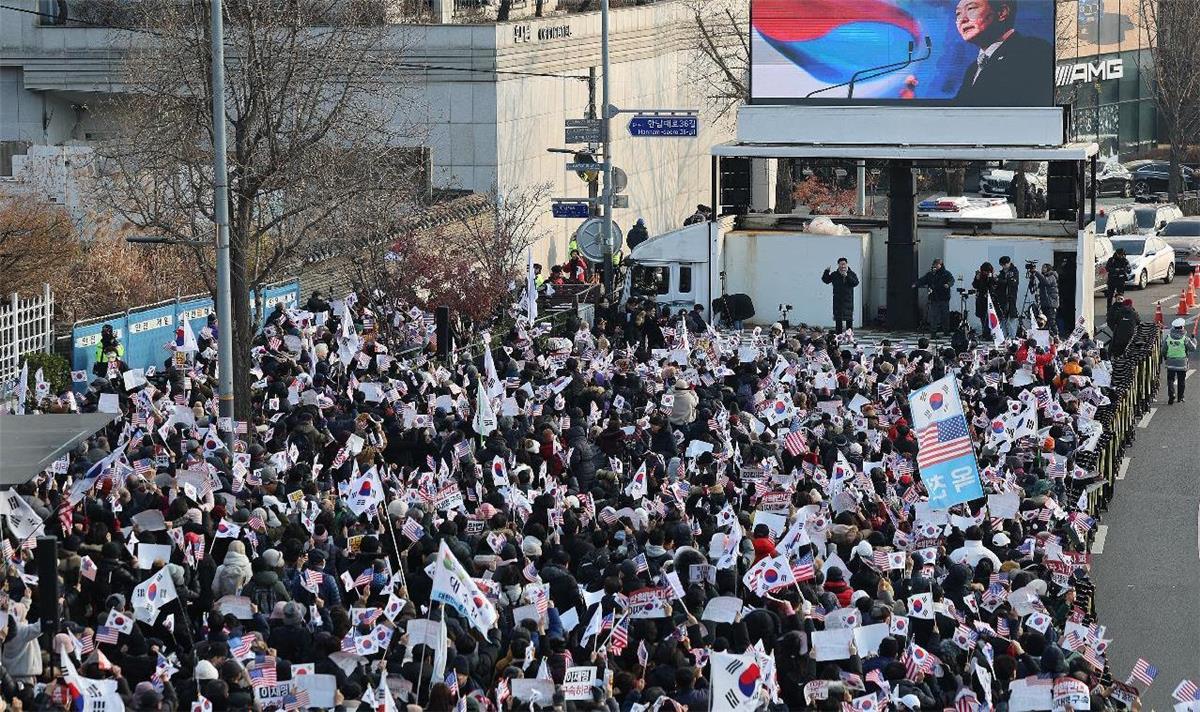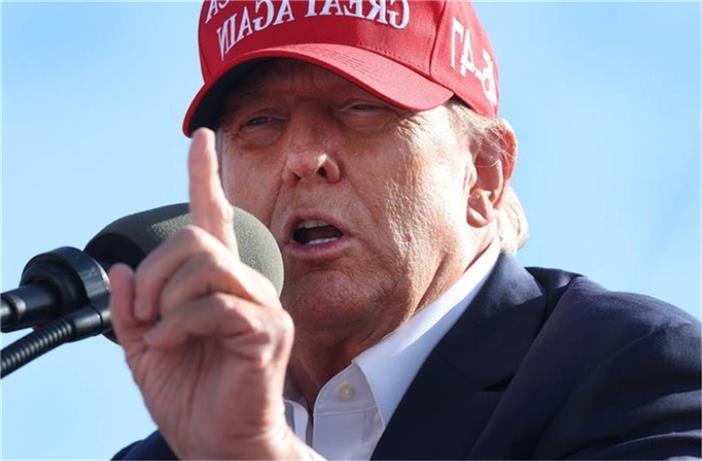5 Keywords to Understand the Arrest of Yoon Suk-yeol: Over 100 People Confronted Each Other for over 5 Hours

On December 31, 2024, the Seoul Western District Court issued an arrest warrant for Yoon Suk-yeol, the president of South Korea, on charges of inciting internal disturbance and abuse of power, along with a search warrant for the presidential residence. This marks the first time in South Korea's constitutional history that an arrest warrant has been issued for an incumbent president.
On the morning of January 3, investigators from the Special Prosecutor's Office for High-Level Public Officials, commonly known as the Public Prosecutor's Office, arrived at the presidential residence in vehicles to execute the arrest warrant.
After about five and a half hours of confrontation, the Public Prosecutor's Office suspended the execution of the arrest warrant at 1:30 p.m. local time. Here are five keywords that capture the key moments of this event.
Scene of the confrontation between the Public Prosecutor's Office and the Presidential Guard at the presidential residence in Hanam-dong, Jongno-gu, Seoul, South Korea, early morning on January 3, 2024.
Confrontation
Earlier in the day on January 3, five vehicles carrying around 30 investigators from the Public Prosecutor's Office departed from the government office building in Goyang, Gyeonggi-do, and arrived at the presidential residence in Hanam-dong, Jongno-gu, Seoul, to arrest Yoon Suk-yeol.
Korean public prosecutor's office vehicles near the presidential residence in Seoul on January 3, 2024.
According to the National Investigation Department of the Police Chiefs Office, a total of 150 people, including 30 Public Prosecutor's Office investigators and 120 police officers, were mobilized to execute the arrest warrant for Yoon.
Around 8:02 a.m. local time, a group of around 35 Public Prosecutor's Office investigators entered the front gate of the presidential residence.
Around 8:04 a.m. local time, the investigators began to execute the arrest warrant for Yoon. The investigators walked through the roadblock set up by the Presidential Guard at the front of the presidential residence and proceeded to the building. At the scene, the investigators clashed physically with the Presidential Guards.
After breaking through the first and second lines of resistance set up within the presidential residence compound, the Public Prosecutor's Office clashed again with the Presidential Guard at the entrance to the residence building.
The investigators showed the arrest warrant to the head of the Presidential Guard and requested assistance, but the head of the Presidential Guard refused to comply with the warrant, citing the National Security Law and the "Presidential Security Zone" within the residence compound.
After attempting to execute the arrest warrant for over five hours, the Public Prosecutor's Office decided to postpone the arrest at 1:30 p.m. local time, citing a lack of cooperation. The Public Prosecutor's Office expressed deep regret over Yoon's attitude, stating that it would discuss the matter and determine how to proceed.
The Public Prosecutor's Office left the presidential residence.
Is the Presidential Guard's refusal to admit the Public Prosecutor's Office lawful?
Yoon's lawyer's team entered the presidential residence.
Earlier in the day on January 3, Yoon's lawyer's team entered the presidential residence.
The lead attorney for Yoon, Yoon Gae-gon, said, "The execution of the arrest warrant by the Public Prosecutor's Office is illegal, and we will pursue all legal measures."
The Public Prosecutor's Office arrived at the presidential residence in Seoul on the morning of January 3 to arrest Yoon.
The lawyer's team representing Yoon issued a statement saying, "The arrest warrant requested by the Public Prosecutor's Office, which has no authority to investigate the crime of inciting internal disturbance and was issued by the Seoul Western District Court, is a fundamental violation of the Constitution and criminal procedure law, and therefore, the execution of the warrant is illegal."
The statement continued, "If the Public Prosecutor's Office executes an unconstitutional and illegal arrest warrant and the police cooperate with the execution, the Public Prosecutor's Office and the police will commit the offense of unlawful arrest under Article 124 of the Criminal Code," and "If there is physical conflict during the execution, the Public Prosecutor's Office and the police will commit the offenses of abuse of official authority and obstruction of special public duty."
Silence
The presidential office has maintained silence regarding the Public Prosecutor's Office's attempt to execute Yoon's arrest warrant.
The presidential office said that how Yoon responds to the arrest warrant is "a matter that Yoon's lawyer's team should decide."
Presidential office officials allegedly watched the scene of the confrontation live.
Before executing the warrant, the Public Prosecutor's Office sent a public document to Acting President Choi Seong-mu, Presidential Chief of Staff Jung Jin-suk, and State Minister for National Policy Bang Ji-sun. The Public Prosecutor's Office requested that the presidential office direct the Presidential Guard to cooperate with the execution of the arrest warrant. The presidential office replied, "The Presidential Chief of Staff has no authority to command or supervise the Presidential Guard."
Criticism
On January 3, the Democratic Party of Korea, the largest opposition party, sharply criticized Yoon's refusal to cooperate with the Public Prosecutor's Office's attempt to execute the arrest warrant.
Party Whip Park Jang-dae said at a meeting of the party's highest council at the National Assembly, "Yoon must comply with the order of the people and accept the execution of the arrest warrant."
Highest council member Chun Hyeon-hee said, "The Presidential Guard also should not commit the offense of 'obstructing special public duty execution' and should not blindly comply with illegal orders from their superiors." Highest council member Kim Byeong-jo said, "The mission of the Presidential Guard is not to protect the 'ringleader of the internal disturbance.' Please stop the second act of internal disturbance immediately."
The Democratic Party's chief spokesperson, Jo Seong-rae, said, "If Yoon orders the Presidential Guard not to accept the execution of the arrest warrant, we will report Yoon."
Protest
On January 3, Yoon's supporters gathered near the presidential residence, protesting against his arrest.
Yoon's supporters protested against his arrest outside the presidential residence in Seoul on January 3, 2024.
Yoon's camp has consistently denied the charges against him and has taken a clear stance against the arrest. Yoon's lawyer, Lee Gae-gon, requested the Seoul Western District Court to object to the execution of the arrest warrant and the search warrant in the afternoon of December 2.
Although Yoon's camp and his supporters are opposed to the court's decision, mainstream public opinion still supports Yoon's impeachment. According to a recent poll by Korea's KBS television station at the beginning of the New Year, nearly seven out of 10 respondents said that Yoon should be removed from office by the Constitutional Court's confirmation of the impeachment decision.
What Now as the Arrest Warrant is Temporarily Suspended?
The arrest warrant for Yoon will be valid for seven days from the date of issuance, which is from December 31, 2024, to January 6, 2025. After the failed attempt to arrest Yoon on January 3, the warrant will remain valid for three more days.
The Special Investigation Department said on January 3 that it will decide on the next steps after discussing the matter, adding, "We deeply regret the attitude of the suspect who does not cooperate with the legal process."
Vehicles carrying the Special Prosecutor's Office investigators
If the arrest warrant is executed successfully, the Public Prosecutor's Office has plans to take Yoon to the Special Prosecutor's Office at the government office building in Goyang, Gyeonggi-do, and conduct an investigation there. Afterwards, Yoon would be transferred to the Seoul Detention Center for detention. The Public Prosecutor's Office also plans to record the entire investigation process with video and audio.
In accordance with legal procedures, the Special Prosecutor's Office may detain Yoon for 48 hours from the time of his arrest and conduct an investigation. If the Special Prosecutor's Office fails to apply for a detention warrant within the 48-hour detention period, it must release Yoon immediately. If the detention warrant is granted, Yoon could be detained for up to 20 days.
 Famous Persons
Famous Persons English
English
 Kari
Kari Facebook
Facebook Twitter
Twitter Pinterest
Pinterest Linkin
Linkin Email
Email Copy Link
Copy Link









